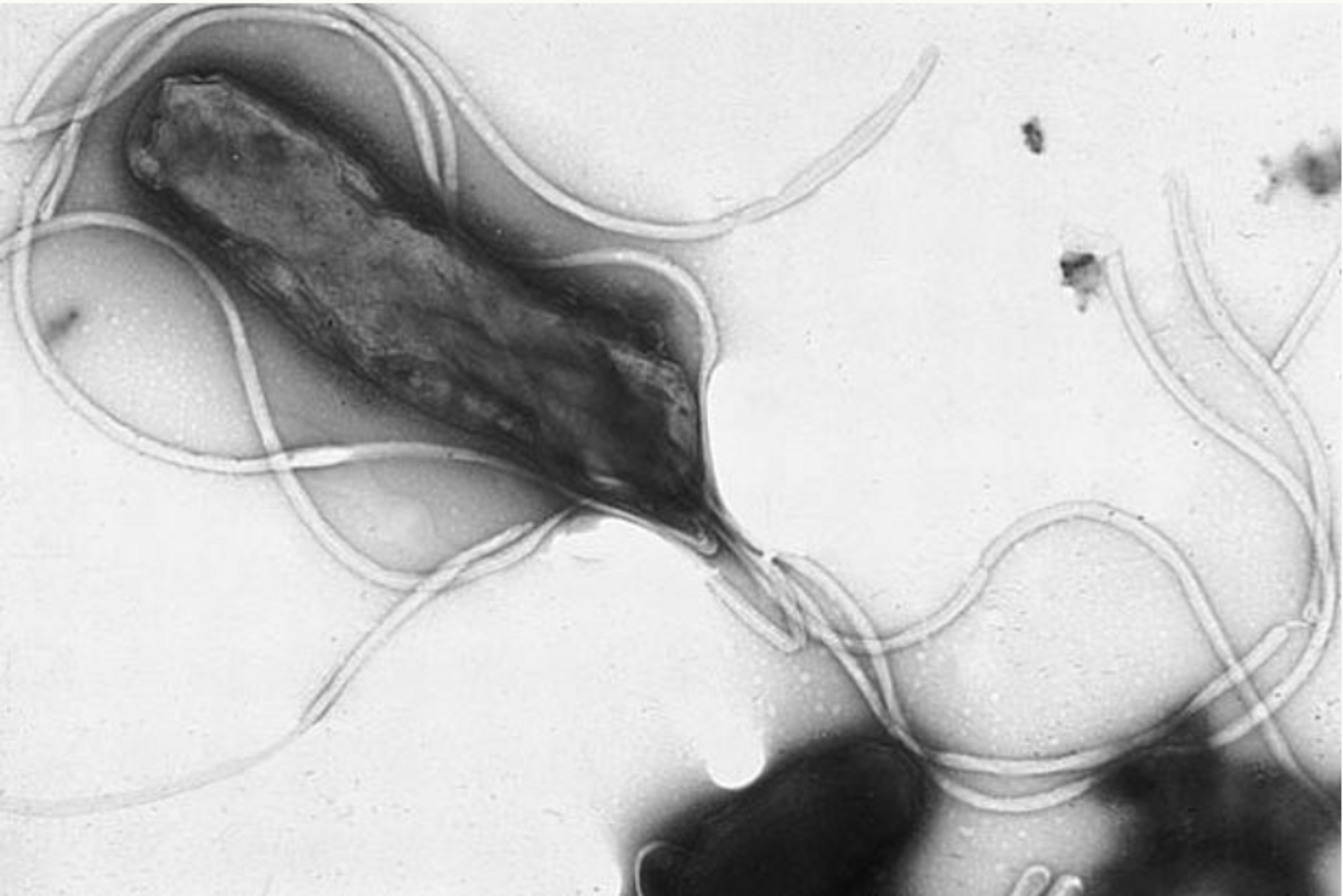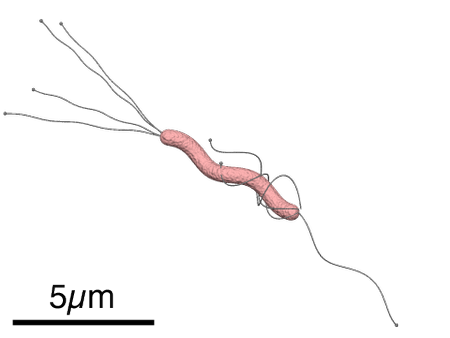Stomach Ulcer Bacterium Could Become an Important Weapon Against Alzheimer’s and Parkinson’s Disease
The bacterium Helicobacter pylori, best known for causing stomach ulcers, may also hold potential in the fight against Alzheimer’s and Parkinson’s disease. New research involving scientists from Aarhus University has shown that the bacterium produces a protein that appears to prevent the formation of the protein clumps—known as amyloid aggregates—typically associated with these neurodegenerative conditions.

Author

Lasse Foghsgaard
Science Editor at Politikken
lasse.foghsgaard@pol.dk
Half of the world’s population carries the bacterium
There is a good chance you carry Helicobacter pylori in your stomach—about one in two people worldwide are infected. In Denmark, the prevalence is slightly lower, with estimates suggesting around one in five Danes carry the bacterium.
In most cases, the infection is harmless, and people do not experience symptoms. However, for some, it can lead to ulcers or gastritis and, in rare cases, stomach cancer.
Today, however, there is a special reason to turn our attention to this otherwise troublesome bacterium. A research team led by Dr. Gefei Chen at the Karolinska Institute in Stockholm, in collaboration with Professor Daniel Otzen and his team at Aarhus University’s Interdisciplinary Nanoscience Center (iNANO), including William Olsen, Andreas Møllerbjerg, and Lotte Nielsen, has made a striking discovery.
“We’ve discovered that not everything about the stomach ulcer bacterium is bad—its CagA protein can, in our lab studies, prevent the clumping of proteins that occurs in Alzheimer’s and Parkinson’s diseases,”
– Professor Daniel Erik Otzen, Aarhus University
The research has just been published in the renowned scientific journal Science Advances.
Helicobacter pylori

Helicobacter pylori is a bacterium that can be found in the stomach and duodenum.
Infection with the bacterium is usually harmless and does not require treatment. However, the bacterium can cause a previously well-treated stomach ulcer to redevelop quickly if it is not eliminated.
Treatment for stomach ulcers typically involves three different types of medication when this bacterium is present. The treatment has shown good results.
Source: Sundhed.dk
A long road to medicine
Whether the CagA protein can be used in the treatment of these serious brain diseases remains to be seen—it is a long journey ahead. According to Professor Otzen, it must first be tested in animal models to determine whether it works and whether it can cross the blood-brain barrier. Then come three phases of clinical trials in humans, which are both time-consuming and expensive.
“It will take at least 10 years for our basic scientific discovery to potentially result in medicine that could make a difference in treating Alzheimer’s and Parkinson’s,” says Otzen.
“So it’s too early to get ahead of ourselves—there’s still a long way to go.”
Researchers also found that the CagA protein can prevent a different protein from clumping inside pancreatic cells—something associated with type 2 diabetes.
“This gives us an indication that a medical version of the CagA protein could potentially be used for a broad range of diseases where proteins clump together in harmful ways,” says Otzen.
New insights into bacterial invasion
The research also sheds light on how Helicobacter pylori may establish itself in the stomach, successfully penetrating the tough biofilm formed by the body’s own beneficial stomach bacteria—a biofilm partly composed of amyloid structures.
“Amyloid is made of long, thin, spaghetti-like structures, like the steel cables used to reinforce concrete. Our research shows that by producing the CagA protein, the bacterium can prevent the formation of this incredibly strong amyloid, allowing it to break through the biofilm and establish itself,” explains Otzen.
Professor Otzen describes the CagA protein as a “universal key” that appears capable of breaking down stubborn amyloid structures wherever they are found—in nature and in the human body.
“It’s fascinating that the CagA protein is a generalist that can bind to many types of amyloids and stop them from growing. This shows how important basic research is. Studying a stomach ulcer bacterium can lead to unexpected breakthroughs and potentially new treatments for entirely different diseases,” he says.
The discovery has already sparked international interest. Professor Daniel Otzen was recently interviewed by the BBC, where he discussed the potential of the CagA protein as a future tool in fighting neurodegenerative diseases such as Alzheimer’s and Parkinson’s. The interview begins around 38 minutes into the program.
Daniel Erik Otzen

- Born in 1969 in Sønderborg
- Grew up in Malawi (Lilongwe) and attended English boarding school in Blantyre, 1978–83
- Graduated from Rødkilde Gymnasium, Vejle, 1987
- MSc in Chemistry and Biotechnology, Aarhus University, 1992
- Chemist at Novo Nordisk, 1995–97
- Professor of Nanobiotechnology at iNANO, Aarhus University, since 2007
- Awards: EMBO Young Investigator 2003; Silver Medal from the Royal Danish Academy of Sciences and Letters 2003; Carlsberg Biotechnology Prize 2006; Alzheimer Research Foundation Prize 2009; Elite Researcher Prize 2014.
About the study
Study type:
Experimental Molecular Biology
External funding:
G.C. is supported by the Alzheimer’s Association Research Grant, the Petrus and Augusta Hedlunds Stiftelse, Åke Wibergs Stiftelse, the Swedish Alzheimer Foundation, the Åhlén Stiftelsens, Karolinska Institutet Research Foundation Grant, the Stiftelsen för Gamla Tjänarinnor, the Stiftelsen Sigurd och Elsa Goljes Minne, the Loo and Hans Osterman Foundation, Geriatric Diseases Foundation at Karolinska Institutet, the Gun and Bertil Stohne’s Foundation, and the Magnus Bergvall foundation. Z.J. is supported by the China Scholarship Council. C.M. is supported by a VR postdoc grant (2021-00418), David and Astrid Hagelén Foundation, the Alzheimer Foundation, The Swedish Brain Foundation, and the Stiftelsen för Gamla Tjänarinnor.
Conflicts of interest:
The authors declare that they have no competing interests.
Link to the scientific article:
DOI: 10.1126/sciadv.ads752
Zhen Jin, William Pallisgaard Olsen, Cecilia Mörman, Axel Leppert, Rakesh Kumar, Andreas Møllebjerg, Lotte Godthaab Nielsen, Olena V. Moshynets, Mykhaylo S. Frasinyuk, Jokin Yeregui Elosua, Daniel Ferreira, Axel Abelein, Michael Landreh, Stefan D. Knight, Jan Johansson, Daniel E. Otzen, and Gefei Chen
Contact information:
Professor Daniel Otzen
Aarhus University
Interdisciplinary Nanoscience Center (iNANO) and the Department of Molecular Biology & Genetics
Email: dao@inano.au.dk
